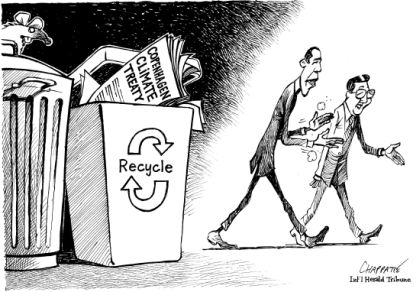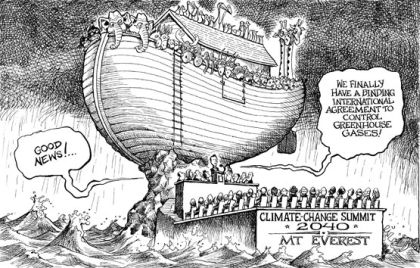
[International Herald
Tribune, France]
Financial Times Deutschland, Germany
Beijing Instead of Copenhagen
"The U.S. must demonstrate a
strong political will to set mandatory national reduction goals - if not this
year, then next. This is the only key to Beijing - and therefore - the only key
to a subsequent global climate agreement."
EDITORIAL
November 18, 2009
Germany
- Financial Times Deutschland - Original Article (German)
The question of
whether global warming can still be limited to tolerable levels will not be
decided in Copenhagen, but negotiated between China and the United States.
Therefore, it was a step forward when the two heads of state, Hu
Jintao and Barack Obama, advocated at their bilateral summit - at least in
principle - for a binding agreement. A classic chicken-and-egg question has stalled
global climate talks: For effective climate protection, it is imperative that both
the U.S. and China reduce their carbon emissions. Yet neither is politically able
to commit unless the other does so as well. America may be responsible for the bulk
of the greenhouse gases emitted so far, which is why the world is waiting with
understandable impatience for the U.S. to come to an internal agreement on a
climate law. But the majority of future emissions will come from emerging
countries, particularly China.
This perspective
would normally make the Western world shudder. On top of that, Beijing is adamant
that developed countries take responsibility first, and steadfastly refuses to commit itself to
international regulation. But in fact, the political leadership has long
recognized that cleaner growth is in China’s interests. And here’s the good
news: long before the Copenhagen summit, the country’s economic model has begun
trending greener. For example, as the U.S. is just now beginning to more strictly
regulate auto emissions, China has already formulated national targets for
efficiency and energy use, and has invested in renewable energy. As for
solar-rooftop technology, the country is already in the major leagues. It would
be unrealistic to demand more substance from China, where the per-capita income
remains a fraction of America’s.

[The
Economist, U.K.]
What’s lacking is
transparency and being able to measure these actions. While it realizes its
ambitions, China's leadership doesn’t, under any circumstances, want developed nations
looking over its shoulder. But that is precisely what may be necessary to get
their American rivals to accept binding, international climate protection
commitments.
Only Washington can bring
Beijing to abandon this attitude. The United States must help China achieve its
climate objectives by providing the know-how, even if its corporate leaders grumble
about it. The announcement of joint research initiatives in areas such as clean
coal and electric vehicles is an important confidence-building step. But above
all, the USA must demonstrate a strong political will to set mandatory national
reduction goals - if not this year, then next. This is
the only key to Beijing. And, therefore, the only key to a subsequent global
agreement.
CLICK
HERE FOR GERMAN VERSION
Posted by WORLDMEETS.US, Dec. 9, 1:06am